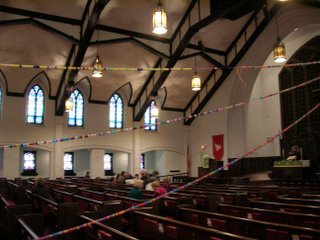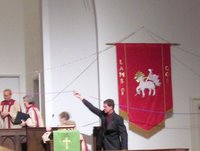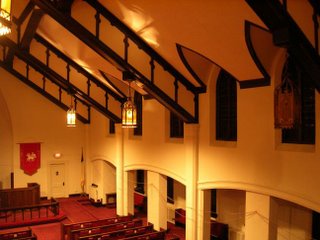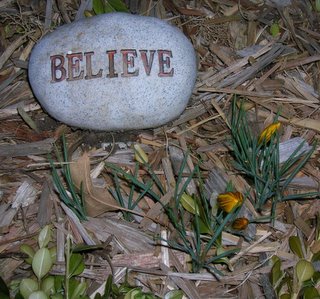
Determination.
It was thick in the air
Like the heat
Pressing, pushing, shoving
the people together
in the small house.
They all wanted to see Jesus.
He stood in the middle of them
Preaching, trying to reach them
with his words.
With his love.
Outside the house
were five men -- all friends.
They had known each other forever,
grown up together.
They could almost read each other's thoughts.
One of them was paralyzed,
and the others had carried him
so that he could meet this man called Jesus.
Determination had brought them this far.
Nothing would stop the four friends.
Not the crowd in the house,
and not the quiet remark of the paralytic,
"Maybe we can come back tomorrow."
The oldest of the five men said,
"Not tomorrow. Today."
Then he started toward the roof.
The climb up the stairs
was only possible
because the four were friends.
They had worked together all their lives.
The job was difficult, slow, sometimes frightening
as the stretcher twisted back and forth.
The man held onto its side with quiet intensity,
to keep from falling.
Together they got the stretcher up to the roof.
They began to dig.
The clay roof was hard,
baked dry in the sun.
Branches ran through it,
making it tougher, connecting and supporting the clay.
Their hands turned red,
Clay packed under their nails,
Sweat dripped and mixed with the dirt
as they lifted pieces of the roof away.
As they lifted away the last piece,
they saw Jesus looking up at them,
as if expecting them.
They lowered their friend through the hole,
and then followed him,
landing on the dirt floor.
First Jesus healed the man's soul,
"Son, your sins are forgiven."
Jesus was looking at the man on the mat,
but all five knew the coolness of the relief
from the weight of guilt.
Next, Jesus healed his body,
"Get up, take your mat and go home."
The man, carried into the house by friends,
stood up without help, picked up the mat.
The crowd parted,
making room for him to leave.
His friends, caked in dirt and sweat,
carried into the building by determination
followed in his wake.
Friendship had motivated them.
Determination had pushed them.
Faith had given them courage.
God had made all five of them whole.

Photos: Harris Riverfront park
Thanks to Carol for the sermon that inspired the images in this poem.






































